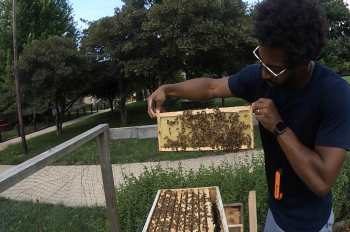Unraveling the Secrets Inside Our Universe

Unraveling the biggest mysteries that the universe has to offer has been a lifelong passion for Claire Zwicker (PHYS, ASTR ’23).
“My grandfather actually taught physics at Illinois Institute of Technology for a while. That helped me gravitate toward physics in my earlier life,” says Zwicker. “Once I was in high school, I really enjoyed the problem solving that went along with physics problems. As I went into community college, I was between aerospace engineering and astrophysics. I chose to major in astrophysics because I find the questions in astronomy and physics to be very interesting to probe and answer.”
Zwicker began to explore these questions early on during her time at Illinois Tech. She first started her research with the Precision Oscillation and Spectrum Experiment project with Associate Professor of Physics Bryce Littlejohn, where she studied neutrinos.
During the project, she performed decommissioning studies, finding ways to improve the reflective light-collecting panels inside a neutrino detector, and conducted data analysis to solve an unusually high, spiky muon background noise within the signals being received.
“That kind of data analysis helped prepare me for my astronomy research,” says Zwicker.
After getting acquainted with scientific research, it didn’t take long for Zwicker to make her impact on the field of astronomy—as an undergrad. She is the lead author of a paper, titled “Investigating Mass Segregation of the Binary Stars in the Open Cluster NGC 6819,” accepted for publication in The Astrophysical Journal in April 2024, and is a co-author of papers titled “Goodbye to Chi by Eye: A Bayesian Analysis of Photometric Binaries in Six Open Clusters,” and “Tracing the Origins of Mass Segregation in M35: Evidence for Primordially Segregated Binaries,” published in The Astrophysical Journal and The Astrophysical Journal Letters, respectively.
Her lead-author paper used photometry from the Gaia, 2MASS, and Pan-STARRS surveys to identify binary stars—two stars that orbit around each other—in a star cluster. In 2023 Zwicker won an honorable mention for the Chambliss Astronomy Achievement Student Award at the 241st meeting of the American Astronomical Society for related research.
Among other characteristics gathered from space-based telescopes and various other sky surveys as part of Zwicker’s research—including stellar age, distance, composition, and whether a system is composed of a single star or pair of stars, among other attributes—she applied a Bayesian statistics software called BASE-9 to look closely into a phenomenon called mass segregation. Her research aimed to learn more information about how binary stars are distributed spatially in a star cluster as it evolves over time.
Zwicker found evidence that the stars in NGC (New General Catalogue) 6819—an open star cluster located about 7,200 light years away from Earth—do show signs of mass segregation, meaning that heavier stars migrated toward the center of the cluster, while lighter stars moved toward the cluster’s edges.
“In my second year at Illinois Tech, I knew that I wanted to continue into academia, but I didn’t really know what the path forward was,” Zwicker says of the research experience that was part of a Research Experience for Undergraduates through Northwestern University.
She had applied to that same REU program two years in a row, but wasn’t selected the first time. Not getting an REU the first time around—and persisting despite it—made the recognition from the American Astronomical Society later in 2023 even more special.
“That was a good upward inflection point,” says Zwicker. “I felt really excited. I had this momentum going, and now I’m going to keep pushing forward. Since then, I’ve kept going to conferences, connecting with other researchers, and sharing my findings.”
In addition to the Chambliss Astronomy Achievement Student Award, Zwicker has been recognized with awards from the National Science Foundation’s Graduate Research Fellowship Program, the Illinois Space Grant Consortium, and the Conference for Undergraduate Women in Physics.
Zwicker will continue her academic pursuits next fall as an astronomy Ph.D. student at the University of Wisconsin-Madison.
While she’s not sure what her research will center on as a graduate student, Zwicker has a number of topics that particularly pique her interest.
But in addition to understanding more about the universe, Zwicker also hopes to share its wonders with the public as she perfects her skills in science communication.
“My goals long term are to keep promoting scientific advancement and engage with the community on astronomy topics,” says Zwicker. “I want to make things more accessible and try to improve my communication skills and really try to keep challenging myself to continue to grow.”




